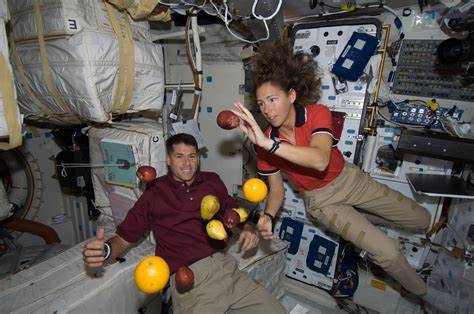A matter of some gravity
One of the common misconceptions we meet in Wonderdome involves gravity.
Children often tell us that ‘there is no gravity in space’.
That’s not true, of course.
Gravity pervades the whole of the universe.
In this blog we’ll explore how it affects us.
We’ll find out how much we would weigh on different worlds.
It’s a matter of some gravity.
Newton’s Law of Gravitation
Gravity is the mutual attraction of objects with mass.
In this blog we’re not going into fundamentals, gravity as a curvature of spacetime.
Instead we’ll look at its effects.
We’re all familiar with those effects on Earth.
Jump up – and gravity pulls you down.
And most people know that gravity keeps planets in orbit around the Sun.
In a similar way, satellites remain in orbit around Earth.
In 1686, Isaac Newton explained the two factors involved in gravitation in this equation:
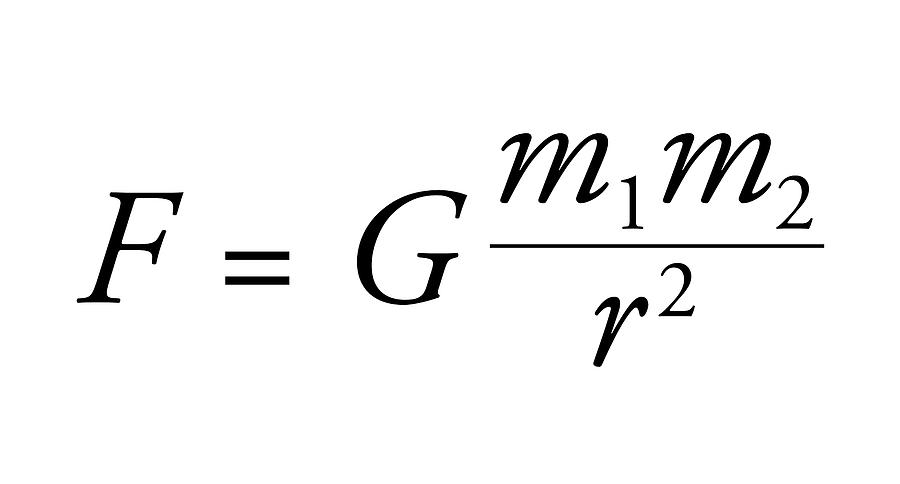
F is the force of gravity, G is a constant, a number.
The key symbols are m1 & m2 and r².
m1 and m2 are the masses of the two objects.
r is the distance between them.
So the two factors in gravitational force are mass and distance.
Mass is the amount of stuff in a body.
So the gravitational force we feel on Earth is a product of our mass mutiplied by Earth’s mass,
M (me) x M ⊕
Of course, our mass is negigible to the mass of our planet.
The distance factor is r².
This means that the force of gravity decreases with the distance squared.
So double the distance and gravity reduces by a factor of 4 (2 x 2).
Five times the distance and it’s 25 times less (5 x 5).
Gravity acts through the centre of an object.
So for a planet, the distance is measured from its centre.
Mass and weight
Mass is the amount of matter in a body.
It is measured in kilograms.
Weight is a measure of how gravity acts on that mass.
Its International System unit (SI unit) is the Newton.
So mass is always the same. Weight depends on gravity.
On Earth, an object with a mass of 1kg would weigh 9.8 Newtons.
So a 50kg person weighs 490 Newtons.
Sounds a lot, doesn’t it?
But of course, we don’t use the correct SI unit to weigh things in daily life.
We use grams & kilograms or pounds & ounces.
For our own weight, it’s kilograms or stones & pounds.
Confusing, hey?
Gravity on different planets
OK, if you’ve got this far, we can now look at different worlds and their gravitational pull.
The planet’s gravity depends on its mass.
The more massive the planet, the greater its gravitational pull..
Dr James O’Donaghue has created a lovely animation that shows the gravitational pull of different planets.
You can find it by clicking here. It’s really good!
I simply have a table for planet gravity.
Earth has a value of 1.
Mercury: 0.4
Venus: 0.9
Earth: 1
Moon: 0.16
Mars: 0.4
Jupiter: 2.4
Saturn 0.9
Uranus: 0.9
Neptune: 1.1
Pluto: 0.06
Values for the inner rocky planets look as expected.
Earth is the largest, Venus almost as big, Mars and Mercury much smaller.
Their gravity reflects their differing masses.
But the values for the gas giant planets look comparitively small.
After all, giant means they are much bigger than Earth.
The low value comes from two factors.
Firstly, the giant planets are made of gas.
They are not very dense so their mass is relatively low.
Saturn would float on water – if you could find a bowl big enough!
Even so, they contain more matter than Earth.
Uranus, for example is 14 times more massive than Earth but is gravitational pull is less..
This is where distance comes in as a factor influencing gravity.
The distance in Newton’s formula is measured from the centre of a planet.
The distance from Earth’s surface to its centre is relatively small.
But the distance from the centre of Uranus to its cloud tops is four times greater
As a result, the gravity at the surface of giant planets is low in comparison to small, rocky worlds.
Weight on different worlds
So. at last, we reach the heart of our exploration of gravity.
We can see how much we would weigh on different planets.
All you have to do is multiply your weight on Earth by the gravity number.
Mercury: 0.4
Venus: 0.9
Earth: 1
Moon: 0.16
Mars: 0.4
Jupiter: 2.3
Saturn 1.1
Uranus: 0.9
Neptune: 1.2
Pluto: 0.06
We’ll take as an example an adult who weighs 50kg on Earth.
On the Moon he/she would weigh 50 x 0.16 = 8 kilos.
Going to the Moon is a great way to lose weight!
Of course his/her mass would be the same.
On Jupiter the same person would weigh 50 x 2.4 = 120 kilos.
His/her weight has increased 15 times but his/her mass has stayed the same.
Try it yourself.
How much would you weigh on other worlds?
If you really want to lose weight, go to Pluto!
Weightlessness
Now we return to where we began.
Why do children say ‘There is no gravity in space’?
The answer is that they see videos of astronauts floating in spacecraft.
Astronauts in the International Space Station are weightless.
It look as though gravity has disappeared.
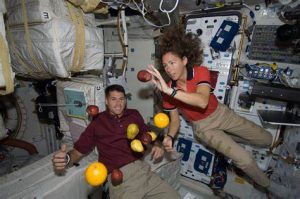
Astronauts on the International Space station. Credit: NASA
It’s an illusion.
Earth’s gravity is acting on the Space Station.
In fact gravity keeps the space station in orbit.
Without the Earth’s gravity, the station would fly off into space at 25,000 km/hour.
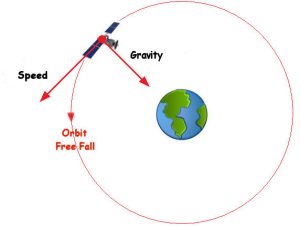
That speed is the key.
It balances the force of gravity and the space station falls around the Earth in orbit.
Inside the station the astronauts, together with loose objects, are in free fall.
They float about as though they are weightless.
Weightlessness is free fall.
It looks great fun!
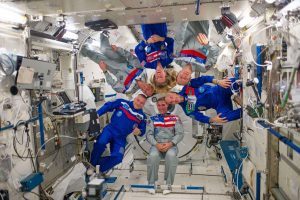
Astronaut team on ISS. Credit: NASA
But to finish, let’s delve into sci-fi, as children in Wonderdome often do.
What would happen if gravity suddenly vanished?
Good news: we would all be weightless, floating for fun.
Bad news: one little push and we would leave the Earth and die in the vacuum of space.
It’s best if gravity continues!

The author: Dennis Ashton is a Fellow of the Royal Astronomical Society and a Wonderdome presenter.
Would you like to hear more Astronomy news?
Do you want to to find out about our upcoming public events?
Follow WonderDome Portable Planetarium on Twitter and Facebook or go to our web site wonderdome.co.uk

